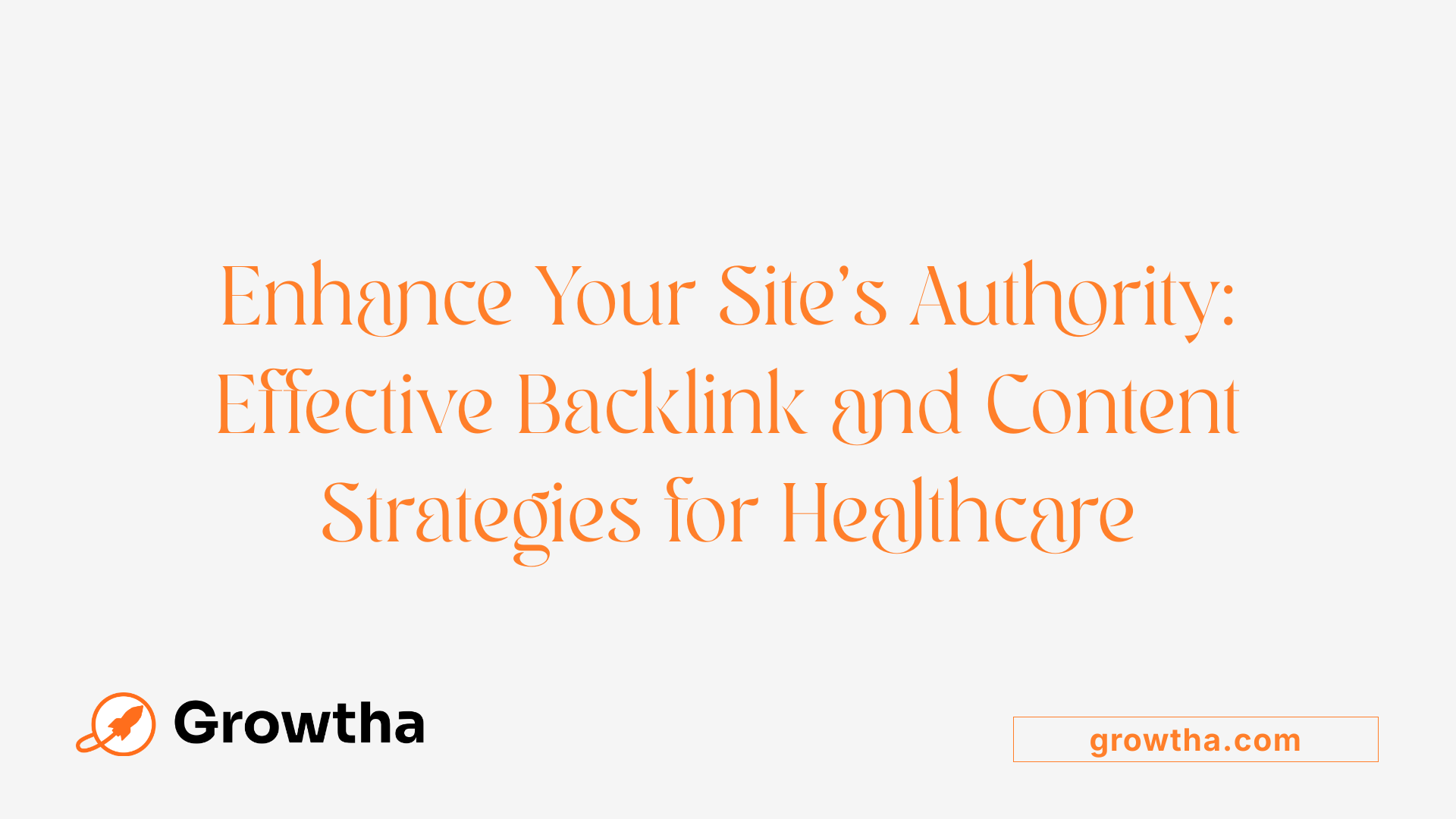How to Optimize a Healthcare Website for SEO
Boost Your Medical Practice's Visibility with Expert SEO Strategies


How to Optimize a Healthcare Website for SEO
Understanding Healthcare SEO: Your Path to Greater Online Reach
In the increasingly digital world of healthcare, optimizing your website for search engines is essential to attract new patients, build trust, and establish your practice’s authority online. Healthcare SEO involves a comprehensive approach that combines technical, content, and local strategies to enhance visibility on major search engines like Google. This article provides an in-depth guide to best practices, current trends, and actionable tips to ensure your healthcare website ranks higher, engages users more effectively, and complies with industry standards.
Core Principles of Healthcare SEO

What are the main types of SEO practices applicable to healthcare websites?
Healthcare websites need to embrace a comprehensive approach to SEO, involving several interconnected strategies. The foundational categories include on-page optimization, off-page efforts, technical SEO, and local SEO.Each strategy plays a vital role in enhancing search engine visibility and addressing unique industry requirements.
On-page SEO involves optimizing webpage elements such as meta titles, descriptions, headers, and content relevance. For healthcare sites, this means ensuring medical accuracy, incorporating relevant keywords—especially long-tail terms—and using schema markup for medical entities. Well-structured content written by qualified professionals boosts credibility.
Off-page SEO focuses on building authority through backlinks from reputable healthcare sites, medical directories, and community platforms. High-quality backlinks act as trust signals to search engines, helping pages rank higher.
Technical SEO ensures the website's technical framework allows for optimal crawling and indexing. Important tasks include improving site speed, implementing HTTPS, fixing broken links, managing robots.txt files, and ensuring mobile responsiveness. Schema markup for FAQs, reviews, and medical information enhances rich snippets in search results.
Local SEO is crucial for practices serving specific geographic regions. It involves optimizing Google My Business profiles, local keywords, and managing patient reviews while maintaining consistent NAP (Name, Address, Phone Number) information across platforms.
Beyond these basics, healthcare providers should develop high-quality, user-centric content that aligns with Google's helpful content updates. Mobile-first optimization, voice search readiness, and consideration of search intent help in reaching the right audiences.
Securing featured snippets through concise, direct answers to common health questions can give a significant advantage. Combining these tactics with ongoing performance analysis ensures the SEO efforts adapt to evolving algorithms and user behaviors.
What are the typical costs associated with healthcare SEO services?
Investing in healthcare SEO varies depending on goals, scope, and provider expertise. Most healthcare practices opt for monthly retainer services, which typically range from $800 to $5,000 or more per month. Larger or highly competitive markets and comprehensive campaigns may push costs upwards of $10,000 monthly.
One-time projects are also common for specific needs such as website redesign, technical audits, or initial content overhaul. These can cost between $1,500 and over $10,000, depending on project complexity.
Hourly consulting rates are usually between $100 and $300, with many providers charging in the $51 to $100 range. The overall expense depends on factors like practice size, number of locations, and competitive environment.
On average, in 2025, healthcare providers might spend between $500 and $7,500 monthly on SEO services, with larger institutions investing more for long-term growth and sustained search presence.
This investment is balanced against the benefits of increased visibility, higher quality patient traffic, and improved online reputation, which are critical in the competitive healthcare landscape.
| Cost Range | Typical Services | Additional Notes |
|---|---|---|
| $800-$5,000/month | SEO management, content creation, link building, technical SEO | Varies with practice size and goals |
| $1,500-$10,000+ | One-time website or campaign projects | For specific upgrades or audits |
| $51-$300/hour | Consulting and expert advice | Based on experience and specialization |
Understanding these costs helps healthcare providers allocate resources effectively, ensuring a strategic and impactful SEO strategy.
Why is high-quality, accurate content creation vital in healthcare SEO?
Creating high-quality content is at the heart of successful healthcare SEO. Medical information shapes patient trust and influences search rankings. Search engines prioritize content that demonstrates expertise, accuracy, and relevance.
Content should be created or reviewed by qualified healthcare professionals, ensuring it complies with industry standards and regulations such as HIPAA. Well-researched articles, FAQs, blogs, videos, and infographics that address patient questions can improve engagement and dwell time.
Regularly updating content ensures accuracy and incorporates the latest medical guidelines, helping maintain authority. Using clear language and multimedia makes complex health topics accessible and engaging.
In addition to boosting SEO, credible content enhances reputation and encourages patient interaction. Testimonials, reviews, and authoritative sources cited within content build trustworthiness.
How does adherence to the E-E-A-T framework improve healthcare SEO?
E-E-A-T—Experience, Expertise, Authority, and Trust—is a set of principles Google emphasizes for ranking health-related content. Demonstrating these factors is crucial in the healthcare niche, where misinformation can have serious consequences.
Experience signifies content authored or reviewed by healthcare providers with relevant professional backgrounds. Showcasing qualifications, credentials, and detailed author bios signals credibility.
Expertise involves providing accurate, comprehensive, and well-referenced health information. Employing recent research, citing reputable sources like WHO or CDC, and aligning content with current standards affirm authority.
Authority is built through backlinks from trusted healthcare sites, mentions, and recognition in the industry. Content collaborations with medical professionals also reinforce authority.
Trustworthiness involves transparency, such as clear contact information, privacy policies, and disclaimers. Secure website practices (HTTPS) and positive patient reviews further support trust.
Adhering to E-E-A-T principles not only enhances rankings but also reinforces patient confidence, a crucial factor given the sensitive nature of healthcare information.
How do healthcare regulations like HIPAA influence SEO strategies?
Healthcare SEO must comply with regulations such as HIPAA, which governs patient privacy and data security. This compliance affects content, website design, and online interactions.
SEO strategies should avoid exposing protected health information (PHI) and ensure secure handling of patient data. Using secure forms, SSL certificates, and clear privacy policies is essential.
Content dissemination must align with legal standards, avoiding unverified claims or sensitive disclosures. Patient reviews and testimonials should be managed carefully to maintain confidentiality.
Moreover, understanding regional laws and adhering to FDA guidelines for medical content are necessary. Properly displaying certifications and accreditations also reinforces compliance.
In essence, while optimizing for search engines, healthcare providers must prioritize patient privacy, legal compliance, and ethical practices, creating a trustworthy foundation for online growth.
This integration of regulatory adherence with SEO best practices ensures that healthcare websites not only rank well but also uphold the standards expected in the industry.
Why Healthcare SEO Matters for Your Practice

How does healthcare SEO improve an online medical presence?
Healthcare SEO significantly boosts a medical practice’s visibility online by ensuring that the practice appears prominently in search engine results for relevant health-related queries. When potential patients search for services such as “family doctor near me” or “urgent care in
This process involves targeted keyword research, including long-tail keywords that match specific patient questions and needs. Creating authoritative, well-researched content following Google’s E-E-A-T (Experience, Expertise, Authority, Trustworthiness) guidelines builds credibility and reassures visitors about the quality of care.
Technical optimizations such as fast-loading pages, a logical website structure, and mobile responsiveness improve user experience and help pages get indexed faster by search engines. Comprehensive local SEO strategies, including claiming and optimizing your Google My Business profile, using location-based keywords, and managing online reviews, further enhance local visibility, attracting nearby patients.
Partnering with healthcare SEO specialists ensures compliance with healthcare regulations like HIPAA while employing proven industry strategies. The combined effect of these efforts results in increased web traffic, more qualified patient inquiries, and a stronger online reputation, essential for thriving in the competitive healthcare landscape.
Overall, healthcare SEO is an indispensable tool for elevating your medical practice’s online presence, leading to sustained growth and trustworthiness in your community.
Impact on visibility, patient acquisition, and credibility
Healthcare SEO directly influences how visible a practice is in local and broader search results. Improved visibility means more organic traffic, higher patient inquiries, and increased appointment bookings. High-quality, relevant content and authoritative backlinks solidify your credibility, making patients more likely to trust your practice.
Integrating reviews, testimonials, and transparent provider information builds trust, which is vital in healthcare. Search engines prioritize trustworthy content, and followers tend to choose providers that appear reputable and accessible.
The significance of local SEO and reputation management
Local SEO strategies are crucial because most healthcare services are location-specific. Creating and optimizing Google My Business profiles, encouraging satisfied patients to leave reviews, and updating your local citations boost your practice’s rankings in “near me” searches.
Reputation management, including actively monitoring and responding to reviews, enhances your online credibility. Positive reviews serve as social proof and influence new patient decisions, which results in higher engagement and stronger community trust.
How SEO leads to measurable results in healthcare
Unlike traditional marketing, healthcare SEO provides tangible metrics such as increased organic traffic, improved keyword rankings, and higher conversion rates. Using tools like Google Analytics and Search Console, practices can track performance, analyze visitor behavior, and refine their strategies.
Monitoring these metrics helps identify successful tactics and areas needing improvement, ensuring continuous growth. Over time, consistent SEO efforts translate into sustained website authority, better patient relationships, and increased revenue.
| Aspect | Description | Example Metrics |
|---|---|---|
| Visibility | Better search engine ranking | Keyword position, impressions |
| Engagement | Increased user interaction | Bounce rate, average session duration |
| Conversion | Patient inquiries or bookings | Contact form submissions, appointment schedulings |
| Reputation | Online reviews and trust signals | Review ratings, social mentions |
In conclusion, healthcare SEO is an ongoing process that substantially impacts your practice’s online presence, patient reach, and credibility—transforming your website into a powerful marketing asset.
Technical SEO Optimization for Healthcare Websites
How can I optimize a healthcare website for better search engine rankings?
Optimizing a healthcare website for improved search engine rankings requires a combination of high-quality content and solid technical foundation. Start by creating original, comprehensive, and patient-focused content that thoroughly addresses common health concerns and questions. This not only enhances user trust but also aligns with Google’s E-E-A-T (Experience, Expertise, Authority, Trustworthiness) standards.
On the technical side, use descriptive, keyword-rich URLs for each page, and organize website content hierarchically through a logical structure. This helps search engines crawl and index your site efficiently. Employ Google Search Console’s tools, especially the URL Inspection Tool, to ensure all pages are indexed correctly. Confirm that CSS and JavaScript files are accessible so that Google can render your pages properly.
Meta tags matter — craft compelling, relevant meta titles and descriptions for each page, and include alt text for all images to boost search visibility and accessibility. Incorporate internal links using relevant anchor text to establish a clear content hierarchy and facilitate easy navigation.
To promote your website’s authority, earn backlinks from reputable healthcare directories, industry peers, and community sites. Active social media engagement and community involvement further improve discovery.
By consistently monitoring your SEO performance and adhering to Google’s official best practices, you can significantly enhance your healthcare website’s visibility and trustworthiness.
What technical SEO strategies are most effective for healthcare sites?
For healthcare websites, technical SEO is vital, given the sensitive nature of health information and the strict guidelines governing medical content. Implementing structured data (schema markup) is essential — it provides search engines with detailed information about your organization, medical staff, services, and patient reviews.
Speed optimization is also crucial. Reduce server response times by minimizing HTTP requests, which can be achieved by decreasing the number of resources needed on each page. Compress images with formats like WebP and leverage CDNs to distribute content faster across various locations.
Ensure your website is fully mobile-responsive, providing an optimal experience on smartphones and tablets. This is particularly important since over half of healthcare-related searches come from mobile devices.
XML sitemaps should be regularly updated and submitted through Google Search Console to guide search engines to your most important pages. Manage your robots.txt file carefully to prevent indexing of duplicate or non-essential content.
Finally, conduct frequent technical audits to identify and fix issues—such as broken links, duplicate content, or crawl errors—that could hinder your site's performance in search rankings.
By focusing on these technical aspects, healthcare providers can improve site visibility, user experience, and ensure compliance with search engine guidelines, ultimately driving more targeted patient traffic.
More Information
- Search queries: "Technical SEO healthcare", "Healthcare schema markup", "Website speed optimization strategies"
Achieving excellence in technical SEO creates a robust foundation, empowering healthcare websites to reach and assist more patients effectively and reliably in the digital space.
Content Strategy and Keyword Research in Healthcare SEO
How can I optimize a healthcare website for better search engine rankings?
To improve your healthcare website's visibility on search engines, focus first on creating content that is both high-quality and tailored to your audience's needs. This means developing comprehensive and accurate medical information, verified by qualified healthcare professionals, to build trust and authority.
Ensuring your website's technical foundation is solid is equally important. Use descriptive URLs that clearly indicate the page content, and organize your pages with a logical structure—such as silos—that makes it easy for both users and search engines to navigate. Avoid duplicate content issues by implementing canonical tags and regularly updating your material.
Leverage Google's Search Console and the URL Inspection Tool to verify that your pages are being properly crawled and indexed. Check that all resources like CSS and JavaScript files are accessible to prevent indexing problems. This technical health supports your content visibility.
Incorporate relevant keywords naturally within your content. Use descriptive meta titles and meta descriptions that include these keywords to improve click-through rates. Descriptive alt text for images enhances accessibility and search engine understanding.
Promotion is vital. Build backlinks from reputable healthcare sources, engage actively on social media, and participate in community outreach. These efforts increase your site’s authority and discoverability.
Following Google's SEO guidelines, such as those in the SEO Starter Guide, ensures your strategy aligns with best practices to secure higher rankings and sustainable growth in organic traffic.
What role does keyword research play in healthcare SEO?
Keyword research is the cornerstone of successful healthcare SEO because it informs your content strategy according to what your potential patients are searching for. Using tools like Google Search Console and analyzing first-party data—including insights from paid search campaigns—helps you uncover relevant search terms with high conversion potential.
Focusing on both broad (head) keywords and specific long-tail keywords allows your site to rank for a wider array of queries. Long-tail keywords, such as "best dental implant specialist in Chicago," target specific questions and often have less competition, which enhances your chances of ranking higher.
Understanding user intent behind these search terms is crucial. Whether patients seek general information, specific treatments, or provider locations, tailoring content to these intents increases engagement and trust.
Integrate these keywords seamlessly into various on-page elements like titles, headers, URLs, meta descriptions, and within the content itself. This relevance boosts your search engine ranking and attracts targeted audiences seeking credible health information.
Regular keyword analysis ensures your content remains aligned with evolving search trends and health topics, maintaining your website’s relevance and authority in the healthcare niche.
Focused Topics for Further Improvement
| Theme | Area of Focus | Details |
|---|---|---|
| Keyword Research | Tools and Data | Google Search Console, paid search data, first-party insights |
| Content Creation | Medical accuracy | Collaboration with healthcare professionals, current medical guidelines |
| Long-tail Keywords | Specific searches | Local treatments, specialized services, symptom-focused queries |
| On-page Elements | Titles, headers, meta descriptions, alt text | Incorporate relevant keywords, enhance accessibility |
This comprehensive approach to content development and keyword research ensures your healthcare website effectively ranks higher, attracts the right audience, and maintains compliance with industry standards.
Local SEO and Reputation Building for Healthcare Practices
How does healthcare SEO improve an online medical presence?
Healthcare SEO significantly amplifies a medical practice’s visibility on the internet by ensuring that the practice’s website and related listings appear prominently in search engine results when potential patients look for healthcare services. This targeted exposure is crucial because most health-related searches occur online, often at the moment when patients are making decisions about their care.
By implementing strategic keyword research focused on relevant and location-specific search terms, healthcare providers can attract highly targeted traffic. Creating authoritative content that reflects expertise and trustworthiness—core principles of E-E-A-T—builds credibility and encourages patient engagement.
Technical optimization also plays a vital role. Improving site speed, ensuring mobile responsiveness, and organizing website architecture with logical siloing allow search engines and users to navigate easily. Claiming and maintaining Google My Business, Bing Places, and other local listings enhances local SEO, drawing in nearby patients searching for immediate services.
Partnering with seasoned healthcare SEO specialists ensures compliance with regulations like HIPAA and enhances marketing efforts tailored for the healthcare industry. The results include increased website visits, more qualified patient inquiries, and a stronger online reputation, all contributing to long-term growth and trustworthiness.
Optimizing Google My Business profiles
A cornerstone of local healthcare SEO is optimizing the Google My Business (GMB) profile. This process involves verifying the business, filling out complete and accurate information—including address, phone number, hours, and services—and adding high-quality photos of the facility and staff. Regularly posted updates and responding to reviews also improve the profile’s visibility.
Encouraging and managing patient reviews
Patient reviews are powerful signals of trust and credibility. Positive reviews boost local search rankings and influence prospective patients’ decisions. Healthcare practices should proactively encourage satisfied patients to leave reviews, ensure reviews are responded to promptly, and address any negative feedback professionally. Proper review management reinforces a trustworthy reputation and increases the likelihood of higher rankings in local searches.
Creating localized landing pages and content
Localized landing pages tailored to specific locations or services improve search relevance and user experience. These pages should include relevant keywords, location-specific content, and local testimonials. Incorporating schema markup for local businesses helps search engines understand the content better, resulting in richer search snippets and higher visibility.
Consistent NAP citations across directories
Maintaining uniform Name, Address, and Phone Number (NAP) information across all online directories is crucial. Inconsistent information can confuse search engines and diminish local SEO effectiveness. Regular audits and updates across platforms like Healthgrades, Yelp, and local directories ensure coherence, trust, and higher search rankings.
| Strategy | Description | Expected Outcome |
|---|---|---|
| Google My Business Optimization | Complete profile, photos, posts, reviews | Higher visibility in local results |
| Review Management | Encourage reviews, respond professionally | Trust-building, improved rankings |
| Localized Landing Pages | Location-specific content, schema markup | Increased relevance and clicks |
| Consistent NAP Citations | Uniform info across directories | Better trust and search accuracy |
By focusing on these local SEO strategies, healthcare practices can effectively attract more local patients, strengthen their online reputation, and secure a competitive edge in their community.
Building Authority and Backlink Strategies

What are the main types of SEO practices applicable to healthcare websites?
Healthcare websites benefit from a comprehensive SEO approach that involves multiple strategies. On-page SEO optimizes elements like meta titles, descriptions, headers, and content relevance to ensure search engines understand each page’s purpose. Off-page SEO involves acquiring high-quality backlinks from reputable sources, which boosts authority. Technical SEO guarantees that the site loads quickly, is secure with HTTPS, and functions well on mobile devices, making it accessible and trustworthy.
Local SEO helps attract nearby patients by optimizing Google My Business profiles and ensuring consistent NAP (Name, Address, Phone Number) information across directories. Additionally, content creation tailored to patient needs, backed by medical expertise, is crucial to improve relevance and trust.
Emerging SEO practices include optimizing for voice search, leveraging schema markup for medical entities, and enhancing user experience through intuitive design and site speed enhancements. Incorporating E-E-A-T principles (Experience, Expertise, Authority, Trustworthiness) and understanding search intent further refine visibility. These strategies collectively help healthcare providers improve organic rankings, attract new patients, and build a credible online presence.
How do backlinks influence healthcare SEO and website authority?
Backlinks play a pivotal role in establishing your healthcare website’s credibility and authority. When reputable healthcare sites, industry organizations, and authoritative directories link to your content, search engines interpret this as a sign of trustworthiness and relevance, which can significantly improve your ranking.
Effective backlink building involves creating high-value, original medical content that professionals and organizations find useful and authoritative enough to reference. Outreach efforts, such as collaborating with industry experts and engaging in community initiatives, foster relationships that lead to natural backlinks.
It’s crucial to avoid low-quality or spammy links, as these can harm your site’s reputation and search rankings. Instead, focus on earning backlinks from trusted sources like health authorities, government health sites, or respected medical journals.
A strong backlink profile not only elevates search visibility but also enhances your practice’s standing and reputation, ultimately attracting more patients and establishing your practice as a leader in healthcare.
Creating high-value, medically authoritative content
Developing high-quality content is fundamental to healthcare SEO. Content must be accurate, comprehensive, and aligned with current medical guidelines to ensure safety and compliance. Content authored or reviewed by qualified healthcare professionals bolsters the site’s credibility.
Using detailed author bios with professional credentials enhances trust and demonstrates expertise. Incorporating multimedia like videos, infographics, and images makes information more engaging and digestible.
Regular updates on medical topics ensure the information remains current and relevant, which search engines favor. Citing reputable sources such as WHO, CDC, or peer-reviewed journals further supports content authority.
Collaborating with healthcare industry experts
Partnering with doctors, specialists, and healthcare organizations can enhance content quality and credibility. Guest articles, expert interviews, and testimonials not only enrich your website content but also attract backlinks from respected sources.
These collaborations can extend your reach, improve domain authority, and foster community trust. When experts are involved, mention their credentials prominently to reinforce the content’s authority.
Leveraging local directories and partnerships
Listing your practice in local healthcare directories and partnerships strengthens local SEO efforts. These links signal to search engines that your practice is a trusted local provider.
Ensure your Google My Business profile is complete and optimized with current information, photos, services, and patient reviews. Collaborate with local clinics, pharmacies, and health organizations to create referral networks and backlink opportunities.
Link building best practices
Successful backlink strategies include creating valuable, shareable content like medical guides, patient success stories, and industry reports. Outreach efforts should target authoritative health sites, industry blogs, and local business directories.
Avoid unethical practices like link farms or spammy links, which can result in penalties. Instead, focus on building genuine relationships through networking, sponsoring health events, and participating in community health initiatives.
| Aspect | Strategy | Details |
|---|---|---|
| Content | High-value, credible content | Authored by healthcare professionals, updated regularly |
| Collaboration | Partner with experts | Guest posts, interviews, testimonials |
| Local SEO | Optimize local listings | Complete Google My Business, local backlinks |
| Link Building | Earning authoritative links | Outreach, community involvement, high-quality content |
Implementing these practices helps healthcare providers establish authority online, improve search rankings, and foster patient trust. Regular monitoring of backlink profiles with tools like Ahrefs or SEMrush ensures quality links are maintained.
Focusing on robust backlink strategies, creating authoritative content, and leveraging industry partnerships are fundamental to boosting healthcare website authority. These efforts, combined with solid technical SEO and user experience improvements, contribute to a sustainable and impactful healthcare online presence.
Monitoring and Improving Your SEO Efforts

How can I optimize a healthcare website for better search engine rankings?
Optimizing a healthcare website for search engines is essential to ensure visibility among potential patients. Begin by focusing on high-quality, original content that is both accurate and relevant to your audience. This not only builds trust but also aligns with Google's E-E-A-T (Experience, Expertise, Authority, and Trustworthiness) principles.
Ensure your website’s technical health is robust. Use descriptive URLs that reflect the content of each page, maintain a clear and logical site structure, and prevent duplicate content issues. Regularly verify your site’s accessibility using Google's Search Console tools such as the URL Inspection Tool, which confirms that Google can effectively crawl and index all your significant pages.
Incorporate relevant healthcare keywords naturally into your content, meta titles, descriptions, and alt texts for images. Creating compelling meta descriptions boosts click-through rates, while descriptive alt text improves accessibility and indexing.
Further, promote your website through authoritative backlinks from reputable healthcare sites, actively engage on social media platforms, and participate in community outreach. All these efforts enhance your site's authority and discoverability, aligning with Google's guidelines outlined in their SEO Starter Guide.
What tools should I use to monitor and measure healthcare SEO performance?
Effective management of your healthcare SEO strategy depends on regular monitoring and analysis using specialized tools. Google Analytics is vital for tracking user behavior, visitor demographics, conversions, and overall site engagement.
Google Search Console provides insights into how your site is indexed, performance in search results, and keyword rankings. Its features, such as the Coverage report and Performance report, help identify crawl issues and optimize your content for better visibility.
For competitive analysis and deeper insights into backlinks, keyword opportunities, and site health, platforms like SEMrush and Ahrefs are invaluable. These tools enable you to evaluate your website's standing against competitors, identify new backlink opportunities, and uncover keyword gaps.
Consistently tracking metrics such as organic traffic, keyword rankings, bounce rates, page load speeds, and backlink profiles is crucial. Regular performance reviews allow you to refine your content strategy, fix technical issues promptly, and adapt to algorithm updates.
In summary, combining these tools and metrics creates a comprehensive approach to monitor, evaluate, and continuously improve your healthcare SEO efforts, ensuring sustained visibility and engagement.
Emerging Trends and Future Directions in Healthcare SEO
What are current trends and challenges in healthcare SEO?
Healthcare SEO is a rapidly evolving landscape, driven by technological advancements and changing regulatory environments. Several emerging trends are shaping the future of online health marketing.
One of the most influential trends is the impact of Artificial Intelligence (AI) and Large Language Models (LLMs). These technologies are revolutionizing how search engines understand and rank content. For healthcare providers, this means creating more sophisticated, relevant, and user-focused content that aligns with AI-driven search algorithms.
Voice search is also becoming increasingly popular. As more users rely on voice assistants like Siri, Alexa, and Google Assistant, healthcare websites need to optimize for conversational queries. This involves crafting content that answers typical health questions in a natural, question-and-answer format, and implementing structured data to enhance featured snippets.
With the growing dependence on digital platforms, compliance with HIPAA (Health Insurance Portability and Accountability Act) and ensuring data security has never been more critical. Search engines and regulators are intensifying efforts to enforce privacy laws. Healthcare websites must incorporate secure protocols such as HTTPS, practice transparent data handling, and regularly audit their privacy policies to maintain trustworthiness and avoid penalties.
Another significant trend is diversifying digital strategies beyond Google. While Google remains dominant with over 90% market share, optimizing for Bing, Yahoo, and social media channels like Facebook, LinkedIn, and Twitter can expand reach and attract a broader audiencebase. Integrating multiple platforms helps healthcare organizations remain resilient against market shifts and algorithm changes.
Moreover, search engine algorithms are continuously updated, emphasizing high-quality, authoritative, and trustworthy content. To stay competitive, healthcare providers must adapt by frequently updating their content, improving website accessibility for all users—including those with disabilities—and ensuring they meet the latest SEO standards.
Overall, the landscape of healthcare SEO in 2025 involves embracing advanced technologies, prioritizing privacy and security, and adopting a multi-channel digital presence. Keeping pace with these trends is essential for healthcare organizations to maintain visibility, foster trust, and attract new patients effectively.
| Trend/Challenge | Impact | Strategic Response |
|---|---|---|
| AI and LLMs | Transform search interpretation and ranking | Develop relevant, high-quality, and authoritative content |
| Voice Search | Alters query behaviors | Optimize for conversational and question-based keywords |
| HIPAA and Data Security | Increasing regulatory compliance needs | Implement HTTPS, transparent privacy policies, and regular audits |
| Diversification Beyond Google | Expand audience reach | Optimize for Bing, social media, and alternative platforms |
| Algorithm Updates | Focus on content quality and trustworthiness | Regular content updates, clear E-A-T signals, and technical SEO |
This evolving landscape requires healthcare SEO strategies to be dynamic, compliant, and technologically advanced. Implementing these trends ensures that healthcare websites remain visible, trustworthy, and competitive in a crowded digital space.
Summary and Key Takeaways for Healthcare SEO Success
What are some effective strategies and best practices for healthcare website SEO?
Implementing a successful healthcare SEO strategy requires a multifaceted approach. It begins with creating high-quality, accurate, and detailed content that directly addresses patient questions and needs. This content should be developed according to Google’s E-A-T principles—highlighting Expertise, Authority, and Trustworthiness—by involving qualified healthcare professionals and citing reputable sources.
Technical SEO optimizations are essential. Improving site speed by compressing images and minimizing redirects ensures faster load times, which boosts rankings and enhances user experience. Making sure your website is mobile-responsive, accessible, and secure with HTTPS creates a seamless experience for all users and complies with industry standards.
Structured data markup, such as schema for medical conditions, reviews, and healthcare professionals, helps search engines better understand your content, often resulting in rich snippets in search results.
Local SEO is vital for attracting nearby patients. It involves claiming and optimizing your Google My Business profile, consistently managing reviews, and integrating location-specific keywords into your website and content. Creating localized landing pages and backlinks from local directories further increases visibility in local search results.
Building authoritative backlinks from reputable healthcare sources and directories enhances your site’s credibility and search ranking.
Continuous monitoring using tools like Google Analytics, Search Console, SEMrush, or Ahrefs provides insight into your SEO performance. Regularly adjusting your strategy based on these insights keeps your website competitive.
Finally, delivering an excellent user experience by ensuring straightforward navigation, fast page loads, and clear contact options encourages engagement and helps in maintaining high search rankings.
How to keep your healthcare SEO strategy effective?
Healthcare SEO is an ongoing process. Regularly updating your content to reflect the latest medical guidelines and industry standards maintains relevance. Monitoring key performance metrics such as organic traffic, keyword rankings, bounce rate, and conversions helps measure success and identify areas for improvement.
Staying informed about new SEO trends—including changes in Google’s algorithms, HIPAA regulations, and the influence of AI—ensures your practices remain compliant and competitive. Collaborating with healthcare SEO experts can also provide valuable insights and facilitate continuous growth.
Why are trust and user experience core to healthcare SEO?
Trust is paramount in healthcare, and it directly impacts your search rankings. Demonstrating transparency through detailed author information, clear contact details, and citing reputable sources builds this trust.
User experience (UX) factors such as website speed, mobile responsiveness, accessible design, and straightforward navigation directly influence user engagement and satisfaction. Search engines prioritize sites that offer a positive experience to visitors.
Building a reputation through patient reviews and testimonials, and establishing authority via backlinks and high-quality content, further solidifies your site’s credibility.
The role of ongoing improvement and staying updated
Healthcare SEO is dynamic. Regularly auditing your website’s performance, keeping up with industry changes, and refining your strategies ensure continued success. This includes optimizing for emerging search trends, such as voice search and local search, and adhering to new healthcare regulations.
By integrating these practices—combining technical excellence, authoritative content, local optimization, and trust-building—you position your healthcare website to achieve higher visibility, attract more patients, and establish enduring credibility in the digital space.
Implementing a Holistic Approach to Healthcare SEO
Optimizing your healthcare website for SEO is a multifaceted process that combines high-quality content, robust technical SEO, effective local strategies, and ongoing performance monitoring. Adhering to privacy standards, building trust, and staying updated with emerging trends like AI and voice search are crucial to maintaining visibility and credibility in a competitive healthcare landscape. Collaborating with experienced SEO professionals and continuously refining your strategies ensures long-term success in attracting new patients and establishing your practice as a trusted healthcare authority.
References
- Healthcare SEO: how to improve your organic performance
- Healthcare SEO: 5-Step Medical SEO Guide for Beginners
- Healthcare SEO: Complete Industry Guide for 2025
- [PDF] Medical Website Best Practices to Increase SEO - Boston Scientific
- How to Optimize Healthcare SEO with E-E-A-T Strategies
- 7 Healthcare SEO Ideas & Actions To Heal Your Strategy
- SEO for healthcare: how to boost your medical practice's organic traffic
- Tips for Boosting Your Healthcare SEO Strategy This Year







